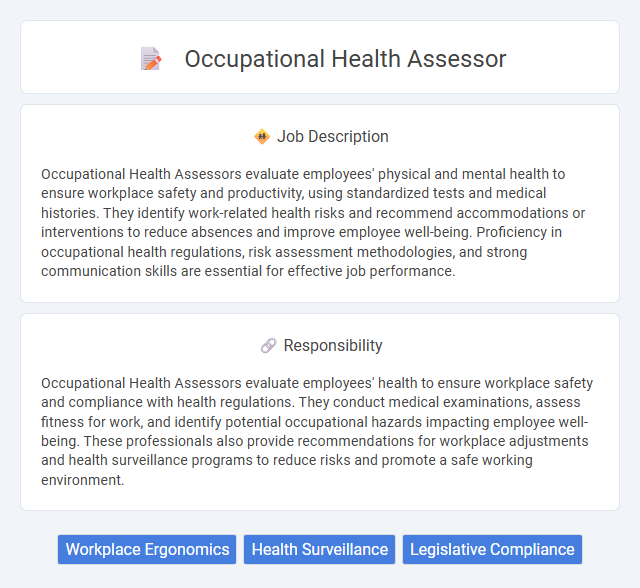
Occupational Health Assessors evaluate employees' physical and mental health to ensure workplace safety and productivity, using standardized tests and medical histories. They identify work-related health risks and recommend accommodations or interventions to reduce absences and improve employee well-being. Proficiency in occupational health regulations, risk assessment methodologies, and strong communication skills are essential for effective job performance.
People with strong analytical skills and attention to detail will likely be suitable for an Occupational Health Assessor role, as the job often requires evaluating health conditions and workplace environments accurately. Individuals who demonstrate empathy and effective communication might be more probable to excel, given the necessity to interact with employees about sensitive health issues. Those with physical limitations that prevent frequent assessments or prolonged periods of concentration may find the demands of this role less compatible with their capabilities.
Qualification
An Occupational Health Assessor typically requires a degree or diploma in occupational health, nursing, or a related healthcare field, complemented by certification from recognized bodies such as the Faculty of Occupational Medicine. Practical experience in workplace health assessments and knowledge of health and safety regulations are essential. Advanced qualifications in risk management or ergonomics further enhance an Assessor's expertise in identifying and mitigating occupational health risks.
Responsibility
Occupational Health Assessors evaluate employees' health to ensure workplace safety and compliance with health regulations. They conduct medical examinations, assess fitness for work, and identify potential occupational hazards impacting employee well-being. These professionals also provide recommendations for workplace adjustments and health surveillance programs to reduce risks and promote a safe working environment.
Benefit
Occupational Health Assessor roles likely provide valuable benefits such as improving workplace safety and employee well-being through expert health evaluations. This job may contribute to reducing absenteeism and enhancing overall productivity by identifying health risks early. Employers might also experience cost savings related to lower injury rates and improved compliance with health regulations.
Challenge
The role of an Occupational Health Assessor likely presents challenges related to accurately evaluating diverse medical conditions and their impact on workplace performance. Balancing the need for thorough assessments with efficiency requirements may prove complex in fast-paced environments. Navigating evolving health regulations and varied employer expectations could further complicate the decision-making process.
Career Advancement
Occupational Health Assessor roles offer significant career advancement opportunities through specialization in areas such as risk assessment, workplace ergonomics, and health surveillance. Certifications like NEBOSH and IOSH enhance professional credibility and open pathways to senior positions, including Occupational Health Manager or Consultant. Continuous professional development and experience with regulatory compliance also support progression into strategic roles within corporate health and safety departments.
Key Terms
Workplace Ergonomics
Occupational Health Assessors specializing in workplace ergonomics analyze work environments to identify risk factors that can lead to musculoskeletal disorders and other health issues. They evaluate workstation design, posture, repetitive movements, and equipment use to recommend adjustments that enhance employee comfort, safety, and productivity. Implementation of ergonomic solutions reduces injury rates and supports compliance with occupational health and safety regulations.
Health Surveillance
Occupational Health Assessors specializing in Health Surveillance conduct systematic monitoring of employees' health to detect early signs of work-related illnesses, fulfilling critical compliance with regulatory requirements such as COSHH and Control of Vibration at Work regulations. They utilize tailored assessments including audiometric testing, lung function tests, and skin checks to identify occupational hazards exposure and prevent long-term health issues. Their expertise supports risk management strategies and ensures sustainable workforce health by enabling timely intervention and accurate health data reporting.
Legislative Compliance
Occupational Health Assessors ensure workplaces comply with health and safety legislation by conducting risk assessments and monitoring employee health. They interpret regulatory standards such as OSHA, COSHH, and the Health and Safety at Work Act to develop effective health surveillance programs. Their expertise supports organizations in meeting legal obligations while minimizing occupational health risks.
 kuljobs.com
kuljobs.com